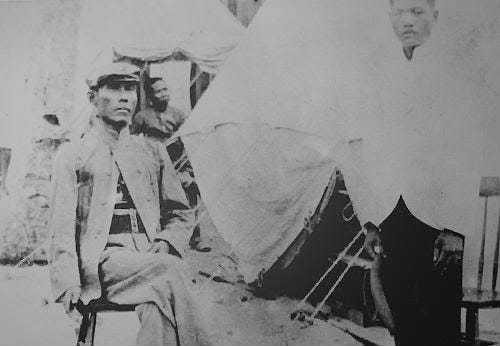Today in history: Mabini and American censorship
A letter to his brother ends up irritating his jailers in Guam

Apolinario Mabini (1864-1903). His diary, written during his exile in Guam, includes today’s entry (17th of February 1901) which recounts his encounter with censorship:
Having been informed that a ship will soon arrive from America and bound for Manila, I wrote my brother, Alejandro Mabini, the following letter with the same date as above.
MY DEAR BROTHER: I guess you have been waiting to hear from your Kuya and me, so let me give you a brief account of what happened.
We boarded the ship Rosencrans in the morning of Tuesday, last January 18 and left Manila Bay in the afternoon of the next day. We sailed toward the south, passing in front of Camarines and Albay. We crossed the strait of San Bernardino and finally we reached the Pacific Sea, heading for the island of Guam toward the east, if I am not mistaken, where we arrived at about noontime on the 24th day.
Don’t ask me about the details of our trip, since I could not leave my cabin even once, during the journey. I do not know of any accidents that happened, except an engine trouble of the ship, which constrained us to stop until past noon in the vastness of the Pacific Ocean. I got a little seasick when I inhaled its saline sea breeze. Kuya has no news to tell you.
According to them, for lack of accommodation, we had to stay on board for a period of 28 days. We disembarked in the afternoon of the 12th of this month in a barrio called Piti. Then we started to walk, which we did most of the time, while the others were carried in carts, towards the direction of Agaña, the former capital of the Marianas Islands. Now it is Guam. After a road’s journey for three fourths of an hour, we came to a barrio called Asan, which they claim, is an hour’s walk from Agaña (4 miles approximately), where we had encamped.
(In spite of having remained on board the ship for quite sometime, the prison house is not constructed yet. In view of this, we are temporarily housed in tents. We are occupying a place which used to be a hospital for the lepers during the Spanish rule. This was burned when the Americans took over the island. Apparently, they are telling us that this place is just the most appropriate for us, for our mind is afflicted with a contagious illness forcing them therefore, to isolate us and prevent us from mingling with our own kind, just like the lepers. I hope our isolation contributes to the pacification of our beloved land, because notwithstanding my exile, I think not of myself, but of all of you out there, who are exposed to so much risk while the war is going on.)
At first glance, this is an arid land. As we took the road from the time we disembarked, we have seen only a few houses. The mountains, as well as the plains we saw have scarce vegetation and the little that we have seen seems to have been scorched by the sun. Seeing it, one is tempted to say that the summer season is just about to end, rather than begin.
Nevertheless, we are occupying a beautiful lot. Can you imagine a land covered with very fine sand? It is even planted with coconut trees all over, whose trunks, I would wish were well-formed and whose foliage more lush and luxuriant, to prevent the scorching sun from penetrating through the canvas roofs of our tents. Facing the North, I behold the ever raging sea; a steep hill hides my back and my left side, and to my right, I could figure out a street, the little huts in the barrio, hidden among the coconut trees and half-destroyed by the last storm. Yonder is another almost shaven hill and behind which, they say, is Agaña hiding, toward the northeast.
At first glance, the natives of this island seem to belong to our race and their climate is the same as ours.
For one who views life not in terms of comfort and ease, our situation is bearable. We have good food, which is indispensable for one’s survival. The Prison’s commanding officer has so far done everything possible that would give us embarrassment and unnecessary work. Since this letter has to pass through him, I don’t want to praise him lest he thinks I’m flattering him. Besides he doesn’t need praises from any one of us.
The next day, after handing over the preceding letter to Mayor Orwig, he came to see me. There was annoyance in his face because he did not like what I’ve written in the paragraph marked with parenthesis. I said I did not mind erasing it, which in fact, I did, sending him the letter again which has not been returned to me. Because of this incident, I have decided not to write anymore, except in extreme cases, so as not to offend the sensibilities of these people.


